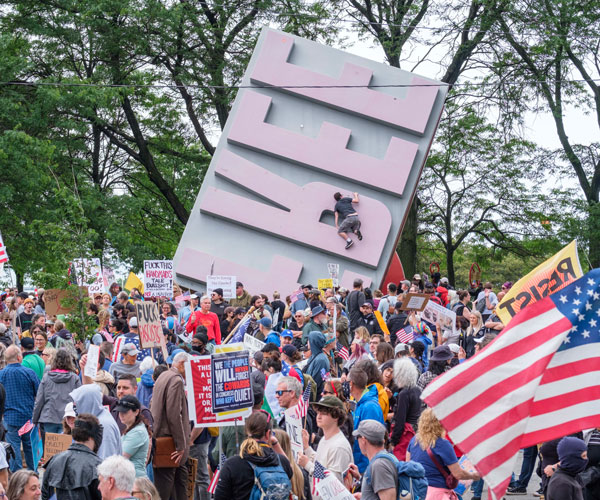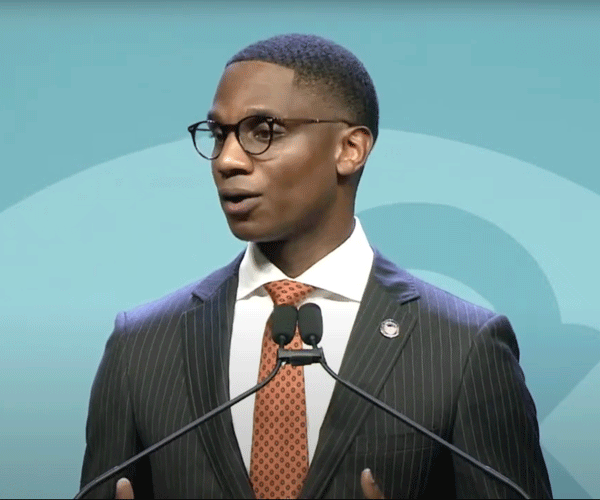-- Tom L. Johnson
Copies of Tom L. Johnson's book, My Story, are hard to find these days.Word has it they are collectors' items, with copies fetching up to $25 each. Maybe that explains it. Maybe they never read the book. Maybe they couldn't find a copy. And if they had, maybe they would have acted differently. Maybe ....
Dennis J. Kucinich spent two years reminding Clevelanders he was mayor in the mold of Tom L. Johnson. He spent two years invoking memories of Johnson's greatness, of battles Johnson waged and won on behalf of the people. But in the end, Johnson's warning of "personal abuses" was ignored, or conveniently forgotten. And it was this betrayal which saw Dennis J. Kucinich and his loyal band of zealots rudely ushered from office.
Any attempt to sift through the ruins of Kucinich's shattered mayoralty can uncover evidence of why they lost, of where they went wrong, of what they did - and did not - accomplish during the most turbulent 24-month period in memory. There are few clues, however, to explain why they acted as they did; why they systematically attempted to destroy the spirit of other human beings, why they favored ridicule, persecution and harassment over sympathy, compassion and conciliation.
In a sense their personalities obstructed and warped their principles. As a result, the noble themes articulated by Kucinich following his 3,000-vote victory over Edward Feighan in the 1977 mayoral runoff election became obscured by twisted logic applied to government by the likes of Bob Weissman and the Grdinas. Why Kucinch permitted them to drag him into political obscurity may never be known. How it happened will become a large part of the Kucinich legacy.
Several days following the October 2nd mayoral primary, Weissman assembled a group of campaign workers to discuss strategy for a comeback -- to explain how the lead piled up by Lieutenant Governor George Voinovich in the primary would be wiped out five weeks later in the runoff election. According to two of present, Weissman implored them to spread the message of Kucinich's greatness while, at the same time, warning of the evils of Voinovich' s ties to the dreaded special interests. But a deafening silence fell over the meeting when one bold staffer asked why, if the Kucimch administration was such a model of perfection, voters had provided Voinovich with such a commanding lead in the primary balloting.
At a loss for words, Weissman hesitated for what seemed like an eternity before blurting, "Because they're ignorant, that's why. They're ignorant."
But in the end, the real ignorance came not from outside of City Hall, but from within. The ignorance came from those who thought they could run roughshod over people and Whip them into line. And it came from the 33-year-old mayor who sat in a plush, second floor office and never lifted a finger to stop it. Even with the clock winding down on Kucinich's term as mayor, with less than four hours left in the final working day of the administration, the abuses went unchecked. And ironically, Weissman's final victim turned out to be a former friend and ally.
Like Weissman, Consumer Affairs Director Herman Kammerman came to Kucinich via the United Auto Workers. But unlike Weissman, Kammerman believed in fairness and decency and had balked at passing out campaign literature which smacked of racism. And so, as other Kucinichites were cleaning out their desks on the last day, Weissman stormed into Kammerman's office and fired him.
"I laughed at him," remembers Kammerman, who following the election returned to Ford Motor Company as a diemaker. "He's [Weissman] so sick. I never realized [in the past] what he was all about." Although news reports at the time indicated Kucinich overruled Weissman's meaningless dismissal of Kammerman, the consumer advocate says events of those final hours convinced a him that, indeed, he was fired - and that the mayor himself went along with the firing. And had Weissman been handed the blanket authority to take similar, meaningless action against other administration members in the three working days between the election November 6th and Voinovich's inauguration, there undoubtedly would have been a massive purge of other Kucinich appointees.
As the re-election campaign progressed, there developed a quiet rebellion among some Kucinich appointees who had soured on the mayor's tactics and the distribution of campaign literature with strong racial overtones. In the final days, some of these disgruntled workers labeled themselves as the "doves," while the Weissman-Grdina group became known as the "hawks." Clearly, as the campaign progressed, the "doves" grew in vast numbers while the "hawks" were reduced to a loyal few.
Because of his personal honesty, his ability to articulate the issues and his stated philosophy about, making government work for the under-privileged, young political activists had flocked to Kucinich over the years out of a deep-seated belief he was committed to social change. In the end, they felt betrayed and disgruntled.
Among those who drifted from Kucinich were the likes of Executive Secretary Joe Tegreene, State Representative Benny Bonanno, Water Commissioner Julius Ciaccia, Sewer Board head Lou Corsi, former Plain Dealer reporter Bob Holden and scores of middle management appointees. When they would summon the courage to complain to the mayor about the administration's tactics, Kucinich would accuse them of being "soft," of "selling out." As a result, the campaign army suffered as the "doves" took refuge on the sidelines, refusing to indulge in the weekend invasions of city neighborhoods.
The most prominent outsider was Tegreene, who retained cordial relations with Kucinich but was treated with contempt by the hard-liners. Himself a candidate for clerk of Municipal Court, Tegreene was left out of strategy sessions involving the mayor, Weissman and Betty Grdina. As the general election neared, Weissman predicted to many that the mayor would stage an upset victory, while Tegreene would lose his election. Actually, while Tegreene did lose, most knowledgeable observers predicted a Tegreene victory but gave Kucinich no chance of staging a comeback.
But while the fainthearted drifted from the flock, the core remained intact. To the end, Weissman and Betty Grdina refused to soften, refused to sell out. And, watching his support deteriorate, Kucinich refused to change.
What it turned out to be were two years where low-level city employees were intimidated because their politics differed with the mayor's, were harassed because they refused to spend weekends campaigning and were fired for trumped up reasons. It turned out to be two years where any significant accomplishments of the administration were overshadowed by the public firing of a police chief, the banning of the Little Sisters of the Poor from City Hall, the midnight raiding of the city commissioner's office, the vindictive attempts to punish political enemies, the arrest of a seven-year-old boy for playing ball inside a swimming pool, the refusal of the mayor to walk across the street to meet with senior citizens, the appointment of countless top officials to city jobs based on their loyalty and not their qualifications and the needless alienation of various neighborhood groups.
The battles with the neighborhood groups were led by Community Development Director Betty Grdina, a Weissman protege who many feel played a larger role in the mayor's demise than Weissman himself. Intelligent and resourceful but unsuited for the job she held, Grdina used the enormous power of her office to reward the administration's friends and punish its enemies. Her weapon: control of the city's annual $37-million block grant funds. The administration's neighborhood strategy, as outlined to staffers by Weissman, was to attempt to keep neighborhood groups in constant chaos. At times, the strategy involved infiltrating the groups with vocal Kucinich supporters and, when necessary, led to the formation of rival groups in an attempt to dilute the power of the original group. Strict guidelines were also established: Don't let groups intimidate you, keep them off guard, never meet with more than five members of a group at one time and refuse to meet with neighborhood representatives unless they secure an appointment in advance.
While the "neighborhood strategy" was devised by Weissman, it was executed by Betty Grdina, who assumed the top community development job after Kucinich's original director, Norman Krumholz, was transferred because he insisted on cooperation with various neighborhood functions. Evidence that Krumholz did not fit the administration's plans for the job emerged in the early days of Kucinich's reign, during a meeting in Krumholz's Rockwell Avenue office with Ed Wagner, vice president of Cardinal Federal Savings and Loan.
Under Wagner's direction, Cardinal Federal has been a leading force in helping rebuild the near West Side as well as several of Cleveland's blighted neighborhoods. As a whole, Cardinal's efforts on behalf of Cleveland's neighborhoods have surpassed all local lending institutions -- including the city's major banks.
On this particular day Wagner and Krumholz were meeting privately to discuss, among other things, a grant for the Ohio City area. Without warning, Grdina burst into the office and in her own inimitable manner, asked, "What is this, a shakedown?"
For Wagner, his first encounter with Grdina proved to be a signal of things to come. "It wa the start of a two-year career of constant run-ins," he remembers.
Throughout the 24-month period one trait Weissman and Grdina were never guilty of was inconsistency. They treated everyone alike. Former Plain Dealer City Hall reporter David Abbott recalled one delightful evening spent with the pair at a National League of cities conference held in St. Louis during December of 1978.
As a reporter, Abbott had acquired a reputation for being somewhat sympathetic to Kucinich and, on this particular evening, invited Weissman and Grdina to dinner. In ordering a well-done steak, Weissman treated the waitress as if she were a city employee. Then for the next hour, Weissman and Grdina proceeded to berate Abbott for a recent story. Needless to say, by the time they walked away from the table Abbott's views of the Kucinich administration had been altered.
While the Weissman-Betty Grdina antics filled the newspapers and air-waves others also made significant contributions. Following one heated Citv Council meeting Assistant Safety Director Tonia Grdina, fire in her eves approached Council President George Forbes and blurted, "I hope you rot in jail." Forbes, under indictment at the time, didn't respond - but didn't forget - the remark.
While the mayor's 236-vote victory in the 1978 recall election should have sounded a warning to Kucinich that the antics of his followers were jeopardizing his political career, the warning went unheeded. Only as the November election neared did it become clear to some Kucinich diehards that Weissman and Betty Grdina were costing the mayor dearly. "If I hear one more person mention Weissman and Betty I think I'll throw up," lamented one Kucinich worker who went door-to-door for the mayor on the West Side. "They (the voters) still like Dennis, but they won't vote for him because of Bob and Betty."
Actually, there is evidence to suggest that Kucinich did know of the political liabilities posed by Weissman and the Grdinas early in his administration but, for whatever reasons, chose not to muzzle them. One close friend of the mayor who detested Weissman tells of sitting in a meeting with Weissman and Kucinich when the mayor suddenly interrupted his political mentor.
"Bob, you're fucked up," Kucinich supposedly said. "You're wrong."
Another story has it that Plain Dealer Publisher Tom Vail, whose endorsement of Kucinich in 1977 helped him win the election but cost Vail dearly among his establishment cronies, convinced Kucinich in early 1978 that Weissman should be fired. Kucinich reportedly attempted to break the news to Weissman that night as they rode together in the same car. What resulted, according to one source, was a four-hour car ride which resulted in Kucinich changing his mind.
Yet another associate of the mayor's who had little use for Weissman was Kucinich's wife, Sandra, whom many of the mayor's real friends describe as "the best thing that ever happened to Dennis because she really cares about him." Once, in a meeting with two well-known allies of the mayor, Weissman expressed alarm at Sandy Kucinich's influence over her husband and complained, "He even listens to her."
The Weissman-Kucinich relationship dates back to 1967, when the 20-year-old copy boy was running for city council in the Tremont area. As head of the United Auto Workers' political arm, Weissman mailed questionnaires to all candidates for Cleveland office. While most candidates returned one-page responses filled with standard political rhetoric, Kucinich sent Weissman a 12-page, typewritten report outlining ways to deal with the city's problems. What resulted was a political marriage which saw Kucinich run for elected office 10 times in the next 12 years with Weissman behind the scenes during every attempt.
While Kucinich obviously had deep respect for Weissman's political abilities, there are many who feel the relationship goes deeper - that Kucinich, the product of an unhappy and troubled childhood, adopted Weissman as his surrogate father.
During their 12 years together, Kucinich acquired many of Weissman's traits. And so, with his political potency diminishing daily, Kucinich refused to lift a finger to stop the erosion. Following the primary election, Kucinich confided to some that he pri vately doubted Weissman's strategy for the runoff election - that he was unsure that the tactics centered around a five-week frontal assault on challenger Voinovich would work.
"But Bob had bailed him out in the past so Dennis felt he better stick with Weissman again, even if it didn't work," explained one insider. In the end, the strategy failed miserably. It failed because Kucinich, on too many occasions, abandoned his own good judgment in favor of the twisted logic offered him by Weissman.
And while anyone would be hard put to explain why Kucinich stuck with his political mentor, the only logical reason is that Kucinich erred because he never really understood the uses and abuses of power and allowed others to use that power in a destructive manner. Power, as the Kucinich team saw it, was the reluctance to grant civil service protection to appointees for fear of losing a grip on them, losing the ability to control them. Power, as the Kucinich team saw it, was to destroy anyone who disagreed; not to merely defeat them but to pound them into submission.
In his Nobel Prize acceptance speech, the late Bertrand Russell described the love of power as the primary political sin. Politics, according to Russell, is "concerned with herds rather than individuals." According to Russell's doctrine, those who stray from the herd are cast off and branded as "idiots, criminals." The only worthy herd members are those who practice "hostility towards other herds." These types of herds, however, are doomed to fail, concluded Russell. The "wise herd" is the one which will tolerate other herds and treat them with respect. Concluded Russell:
In politics, also, a reformer may have just as strong a love of power as a despot. Much that passes as idealism is disguised hatred or disguised love of power. When you see large masses of men swayed by what appear to be noble motives, it is well to look below the surface and ask yourself what it is that makes these motives effective.
History will record that on November 6, 1979, Cleveland voters followed Russell's advice, that they did indeed "look below the surface." And when they looked, they did not like what they saw.



